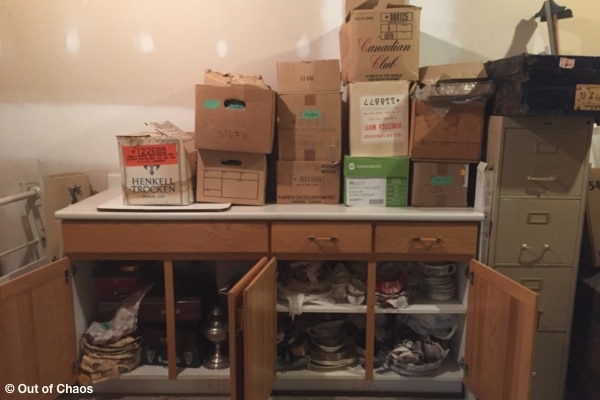
Dear Out of Chaos, I’m ready to declutter and downsize, but my basement is full of other people’s stuff. What should I do? Yours truly, Retired Boomer.
Very often, we receive questions like this one. Or we arrive at a client’s home and find bins of stuff that don’t belong to the homeowner. Here is how to handle some of these situations.
Storing Stuff for Family Members and Friends
The most common scenario is parents who store their children’s stuff. Often it is because the children are not settled in their own homes. They could be living in a university dorm or studying abroad. In this case, we recommend asking the children to declutter their own possessions. And most of the time, the children are happy to do so, even if the decluttering sessions are by video conference.
Occasionally, the “children” in question are grown adults with their own homes (and children). They are definitely able to store their own stuff. The Out of Chaos team can help them declutter at their parent’s home or arrange for them to take their possessions to their own home.
Sometimes our clients store their friend’s belongings. Again, the best thing to do is contact the friends, explain the downsizing situation, and ask them to collect their items by a specific date. In our experience, most friends are understanding and pick up their things.
When They Won’t Take Their Stuff
Sometimes, people (including family members and close friends) won’t remove their stuff in a timely matter – or at all. It is tempting to toss it on the curb on garbage day, but that isn’t the best idea. Unfortunately, they could sue you for damages or accuse you of stealing. It’s unfair, considering you are doing them a favour by storing their items.
In fact, what you can and cannot do legally when storing other people’s stuff varies by jurisdiction. And it depends on the relationship of the people and any written or spoken agreements between them. For example, landlord-tenant relationships differ from family relationships (including ex-spouses/partners). In addition, the law may look at high-value items (jewelry, electronics) differently from low-value items (clothing, memorabilia).
We hope you will never have to get a lawyer involved when storing other people’s stuff, but it is best to get legal advice. However, before you speak with a legal advisor, gather the following information:
- Did the person leave the items with you or ask you to store them?
- Did you offer to keep the items for them?
- Were payment and duration discussed?
- Did you have a verbal or written agreement about the storage situation?
In addition, write down a list of dates when the person accessed or inquired about their stuff and when you reach out to tell them to collect it. It would help if you included details of your conversations too. Save records of your communications (emails, text, voicemail, etc.).
A legal advisor will tell you how to proceed in your specific situation, so please, follow their advice.
Should I Store Other People’s Stuff?
With all the hassle I just mentioned, you might wonder if you should store other people’s stuff. Of course, if you have the space, you are welcome to do so – with some caveats.
Firstly, who wants to store stuff, and what do they want to store? For example, your friend might be taking a temporary job overseas. They can’t take their firearms collection and want you to keep it. Are you comfortable with that? If not, say so.
Next, check with your home insurance company. In the event of a disaster (leaky pipes, fire, etc.), your insurance company may not cover someone else’s stuff unless it belongs to your children who are temporarily living away from home. However, they may be able to include an addendum to your policy for a small fee to cover the other person’s stuff.
Finally, if you agree to store other people’s stuff, ensure you know exactly what is in each container and have them create a detailed inventory for you. Discuss the duration of storage, rate of payment, insurance coverage, and what to do if either party is incapacitated. It doesn’t have to be long and complicated, but a written agreement signed by both parties is a good idea.
Downsizing doesn’t have to be stressful. Out of Chaos can help. Simply send us a secure message through our website.

Great advice!